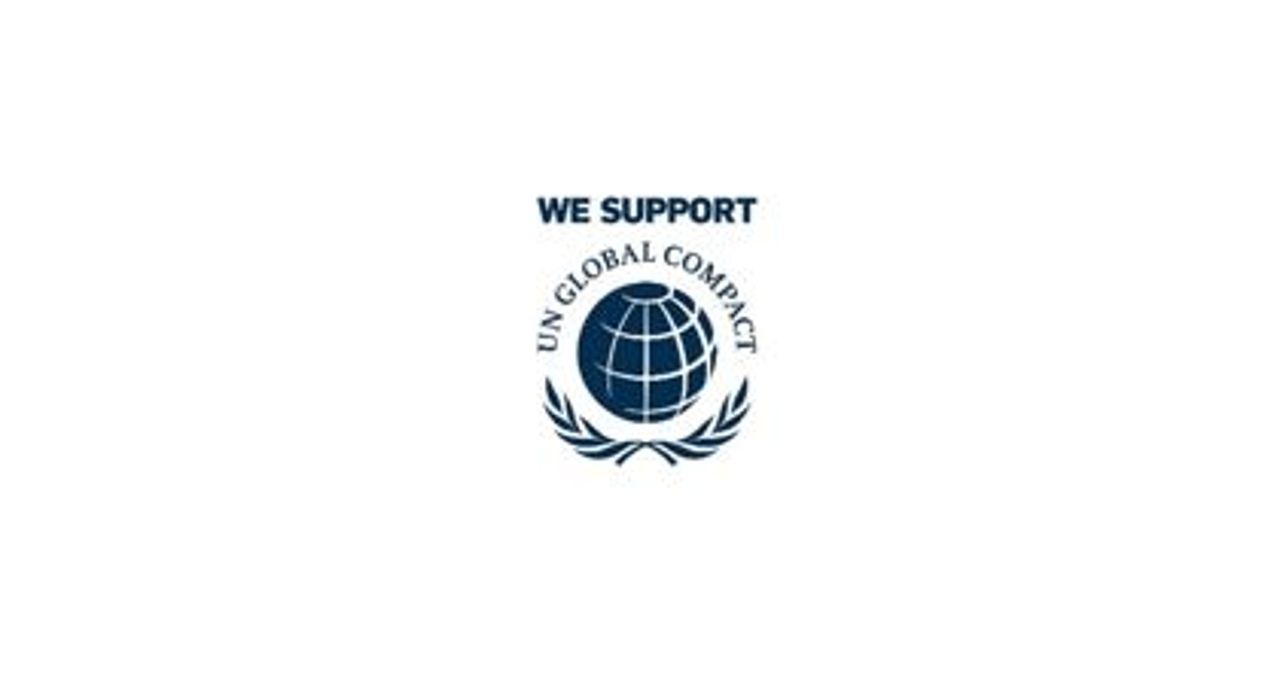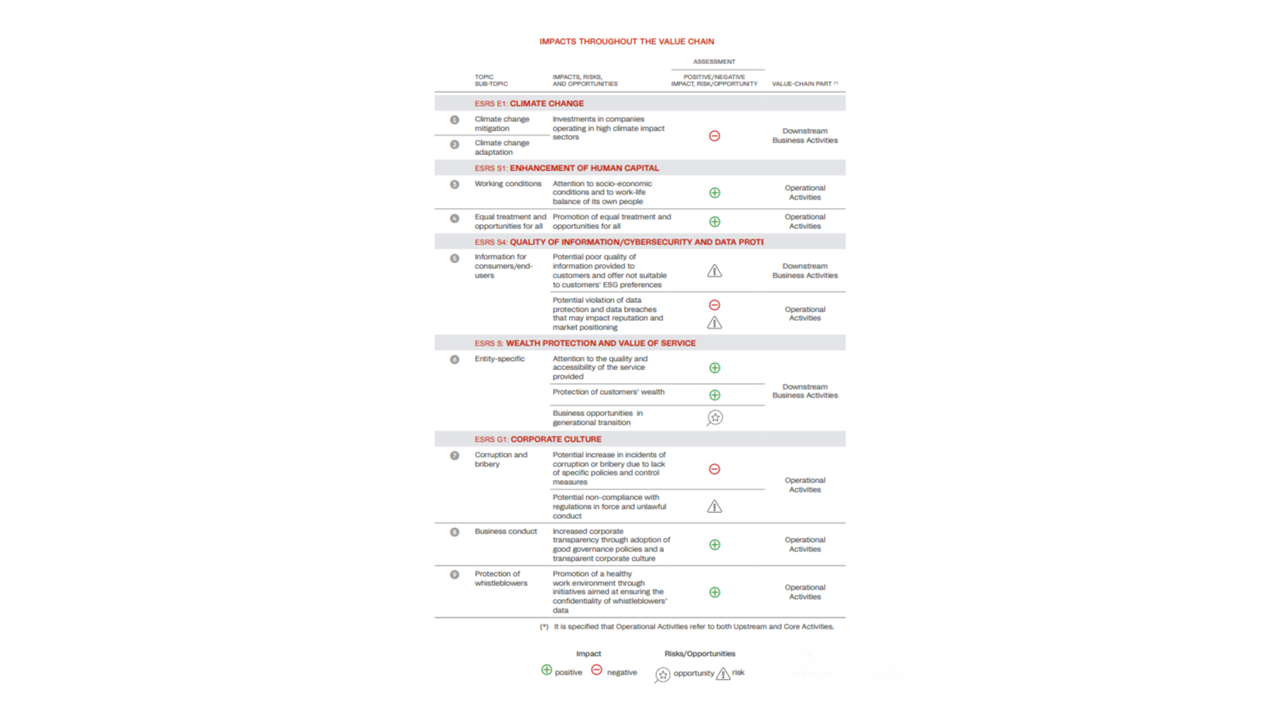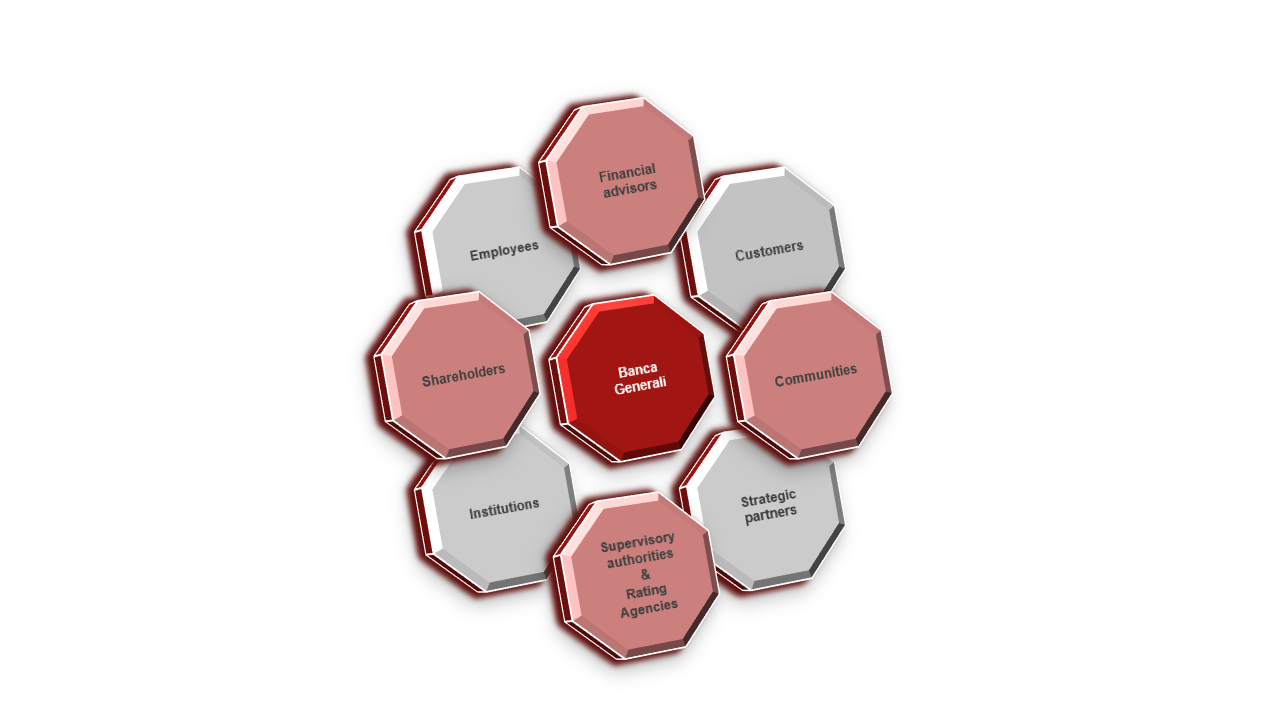
Sustainable governance
We believe that sustainability is the only path to growth, which is why we are committed to implementing the 17 Sustainable Development Goals of the United Nations' 2030 Agenda.
Our sustainable approach
The Bank and its people are focused on protecting households’ wealth with integrity, passion and dedication, with an emphasis on medium-long term objectives. Pursuing a sustainable growth path requires vision, which means taking on social responsibility and understanding and anticipating future, including those related to innovation and the management of generational wealth transfer. For this reason, we focus on future generations, who bring new needs in terms of innovative offerings and digitalization, and we are committed to supporting the entrepreneurial world, where generational transition represents a moment of discontinuity that requires an integrated approach and a strategic partner.
Our goal: a sustainable growth

A responsibility for taking a long-term approach is an intrinsic part of our way of doing business, focused on protecting wealth according to a long-term vision. Therefore, we promote sustainable development that listens to all our stakeholders, seeking to understand their real needs and matching them to the Company’s business goals. Excellence in the wealth advisory market cannot ignore the focus on value creation for all stakeholders who participate in and interact with that market: employees, financial advisors, institutions, shareholders, supervisory authorities, rating agencies, customers, suppliers, strategic partners and communities.
Our sustainable approach is characterised by:
- sustainable growth over time, with entrepreneurial actions aimed at achieving medium-long term economic and commercial results, minimising risks related both to the volatility of the economic-financial scenario, and the inadequate planning of objectives, due to short-term needs;
- people enhancement, encouraging the constant development of skills and professionalism and acknowledging the contribution of individuals to the success of the organisation-all within a work environment that promotes inclusiveness, equal opportunities, and diversity.
- sensitivity to the social context, participating in charitable, cultural and sports initiatives;
- reduction of environmental impacts linked both to our investments, by monitoring our exposure to high-carbon companies and to our operational activities, by taking measures to minimise the consumption of energy, paper and water, and to reduce greenhouse gas emissions to promote the energy transition towards an economy that protects the climate and biodiversity.
In 2024, global economy recorded solid growth, with declining inflation and positive equity market performance, especially in the United States. Central banks began to ease their monetary policies: the ECB cut key interest rates four times for a total of 100 basis points, while the Federal Reserve made three cuts. Easing monetary policies and expectations for further interest rate cuts in Europe have led to a favourable context for Italian households’ demand for financial advisory and asset management products.
Banca Generali was able to promptly seize the opportunities offered by the new market context, focusing on consistent growth and exceeding 6.6 billion euro net inflows, with total client assets managed and administered at 103.8 billion euros. The increase in commercial activities was accompanied by profitable growth: the Bank’s net profit rose by 32% to 431 million euros, setting an all-time high for both the recurring and total components. The Bank’s traditional capital solidity continued to strengthen as well. Total Capital Ratio was 24.4%, or nearly 12 pps above the specific capital requirement. In light of these results, the Board of Directors proposed to distribute a 327 million euro cumulative dividend totally paid in cash.
The satisfaction for the last year’s results is compounded by that for the end of the 2022-2024 Strategic Plan, which aimed at steering Banca Generali along a path of sustained, sustainable and profitable growth, in line with its history. With regard to the results for the three-year period, the Company recorded cumulated net inflows of 18.2 billion euros, with an average 24% increase in net profit, and is going to distribute total cumulative dividends of 8.5 euros per share . These figures mark the achievement of the Strategic Plan’s ambitious targets, confirming the Bank’s resilience and its ability to overcome complex and challenging economic periods, as was the case in the 2022-2023 two-year period.
Beside focusing on financial growth, Banca Generali developed multiple strategic initiatives to strengthen its value of service, with particular reference to solutions dedicated to Private and HNW customers and, more generally, to entrepreneurial families. In addition, in the past three years, the Bank has become increasingly data-driven, implementing data-analytics tactics to support its Financial Advisors’ development and productivity. The creation of an advanced data governance, data management and data warehouse structure puts the Company in an ideal position to exploit the opportunities offered by AI application at times of accelerated technological development.
The year 2024 also marked an important step forward in terms of international expansion. After receiving the Swiss Regulator’s authorisation, BG Suisse obtained the Bank of Italy’s authorisation to operate in Italy under the Free Provision of Services regime which, combined with the investment services provided by Banca Generali in Italy, represents a unique offering in the Italian landscape.
Intermonte, a historical Italian brokerage firm with extensive expertise in advisory for Italian SMEs, was acquired through the voluntary tender offer launched in September 2024 and finalised in just five months with delisting at the beginning of 2025. This acquisition will further catalyse the Bank’s growth and profitability in the coming years.
The Annual Integrated Report 2024 includes the Sustainability Statement pursuant to Directive (EU) 2022/2464 (Corporate Sustainability Reporting Directive – CSRD), in its first year of application. One of the main requirements introduced by the new Directive is the double materiality analysis, which has identified as Banca Generali priorities climate change mitigation, the enhancement of Human Capital, the enhancement of Financial Advisors, cybersecurity and data protection with regard to customers, wealth protection and value of service. Besides being relevant for the purposes of this Report, these topics are especially fundamental for identifying and addressing Banca Generali’s strategic topics in the years to come, so as to define its stakeholder commitment in an increasingly thorough manner.
As the administrative, management and supervisory bodies deem sustainability matters central to the definition of the Company’s strategy and management, the ESG reporting tools Sustainability Dashboard and Climate Risk Assessment have been formalised for the Board of Directors and Board Committees to be able to monitor ESG KPIs and assess climate-related and environmental risks. In 2024, the Board of Directors monitored and approved the integration of the Action Plan, related to the Bank of Italy’s supervisory expectations for climate-related and environmental risks. At the beginning of 2025, the Board also approved the new Climate Transition Plan, which sets new ambitious GHG emission reduction targets for both operational activities and corporate issuers to be reached by 2030, and the Net Zero target by 2040.
As regards the People Strategy policies, the Bank focused on consolidating the sense of belonging, promoting constant alignment between project and business activities, and fostering an inclusive work environment that values uniqueness. Its commitment towards all BG People is clearly reflected in the acceleration of training programmes, which despite their already excellent quality improved even further. Specifically, training programmes focused on regulatory matters and on cybersecurity, innovation, AI and digital skills — including in particular training on Microsoft Copilot Edge — and the development of behavioural and managerial competencies. Overall, 70,749 training hours were provided in 2024, up by 7% compared to 2023 and by 18% on 2022. Besides Employees, the focus on training also extends to Financial Advisors, who were involved in managerial and relationship training programmes aimed at strengthening their role and enhancing their technical-commercial skills, so as to better meet customers’ needs with an increasingly holistic approach, in line with regulatory developments. Among these programmes, the innovative My Academy project with its strategic training courses, the support for obtaining EFPA ESG Advisor certification offered to a cluster of selected Financial Advisors specialised in sustainability matters, and the BG Lab training platform with its renewed content and user experience proved particularly effective.
In line with the commitments undertaken at the launch of the 2022-2024 Strategic Plan, at the end of the year 60% of hirings was under 35 years, 95% of people was involved in sustainability-related initiatives and 99% in digital-related initiatives. Hybrid work was fully confirmed for 100% of eligible employees. We are also particularly proud of having obtained Gender Equality Certification, which confirms the Bank’s attention to equal opportunities policies and to the creation of a work environment based on respect and continuous skill development to guarantee a work experience that always puts people at the centre.
I would also like to highlight that the 2024 Global Engagement Survey conducted on all the Banca Generali Group employees recorded a participation rate of 96% and an engagement score of 86%, testifying once again that the Bank’s overall goals and values are broadly shared and highlighting a strong sense of belonging and sharing of the corporate culture, which have always been distinctive factors of our organisation.
Among the recognitions that Banca Generali received in 2024, I would like to mention the “Best Private Bank in Italy”, bestowed at the prestigious Global Private Banking Awards (FT Group’s PWM) for the sixth time in the past eight years, and the “Best Financial Advisor Network for Customer Satisfaction” award received by Deutsche Institut für Qualität und Finanzen (ITQF) for the eleventh consecutive year. These recognitions confirm the Banking Group’s high reputation and our customers’ appreciation, and reward our constant commitment to offering an excellent service, as testified by the ratings received and by our undeniable commercial success.
To conclude, I would like to thank all the Financial Advisors, Employees, the Chief Executive Officer and his management team, whose work and dedication led to the successful achievement of all the Strategic Plan’s targets. I wish them to forge ahead with this path of sustained, profitable and remunerative growth through 2025 and in the future.
I would also like to sincerely thank my colleagues, the members of the Board of Directors, and the members of the Board of Statutory Auditors for their valuable contribution in terms of experience, expertise and strategic vision that, year after year, support Banca Generali’s development towards increasingly significant objectives.
With the aim of promoting the sustainable development of our business activities and generating long-term value, we have adopted the Sustainability Policy at the Group level.
The Policy:
- defines the Sustainability Framework so as to identify, assess and manage the risks and opportunities associated with ESG factors, in line with the evolution of the industry’s ESG regulations;
- describes the Sustainability Ambition, which must take into account the materiality analysis process and the methods used to integrate ESG factors into the Company and its business;
- illustrates the factors supporting sustainability, including the governance model, internal regulations and the risk framework, remuneration, monitoring and reporting.
This Policy reflects our commitment to the UN Principles for Responsible Investments (PRI) and the Principles of the UN Global Compact.
The Policy aims to integrate into business processes the Banking Group’s Sustainability model outlined in the Charter of Sustainability Commitments in force from time to time and approved by Banca Generali’s Board of Directors that defines the long-term strategic goals for doing business responsibly and living in the community, helping to create a healthy, resilient and sustainable societyInternal Code of Conduct
In pursuing its growth objectives, we remain faithful to the fundamental principles that characterize its ethics, such as transparency, fairness and impartiality. These principles are reiterated in the our Internal Code of Conduct, which is in line with the rules of conduct reported in the Generali Group’s Code of Conduct.
The Internal Code of Conduct defines the minimum rules of conduct to be observed in dealings between colleagues, as well as with customers, competitors, suppliers and the Group’s other stakeholders and contains specific provisions governing the promotion of diversity and inclusion, protection of company assets, conflicts of interest, bribery, financial information and the processing of insider information, the prevention of money laundering, financing for terrorism and international sanctions.
Whistleblowing and AML/CTF/IS Policy
To monitor compliance with the Internal Code of Conduct and in accordance with the applicable legal framework, we have adopted a whistleblowing procedure that makes it possible to collect, assess and manage reports of potential fraudulent phenomena, violations of internal rules and suspect behaviour. The procedure guarantees those involved protection from all forms of retaliation, discrimination or penalisation and ensures them the utmost confidentiality, without prejudice to legal obligations.
In addition, with the aim of combating money-laundering and the financing of terrorism, which constitute a serious threat for the legal economy and can result in destabilising effects, above all for the banking and financial system, we have adopted an Anti-Money Laundering, Counter-Terrorist Financing, and International Sanction Policy. The AML Policy, approved by the Board of Directors, is part of the broader internal control system of our Bank, aimed at ensuring compliance with applicable laws and regulations.

Adhesion to UN Global Compact

At the beginning of 2024, at Banca Generali we have also joined the UN Global Compact, a voluntary initiative launched by the United Nations to encourage businesses the world over to define an economic, social and environmental framework aimed at promoting a sound and sustainable global economy from which everyone can benefit. To this end, as a participant, Banca Generali is committed to share, support and apply within its sphere of influence the ten fundamental principles regarding human rights, labour standards, environmental protection and fight against corruption.
The double materiality analysis is a tool for strategic reading of the Bank’s internal and external context aimed at identifying and determining the priorities of, environmental, social and governance aspects deemed material and significant across our value chain. This analysis is conducted from a dual perspective: identifying the actual or potential impacts of our business activities on people and the environment (inside-out approach), as well as the sustainability-related risks and opportunities (outside-in approach) that may influence the Bank’s financial performance and results, thereby creating or eroding corporate value in the short, medium, or long term.
The double materiality assessment process begins with the definition of the company’s value chain, which for us of Banca Generali is structured to maximize operational efficiency, foster continuous innovation, and offer a wide range of high-quality services to clients, fully reflecting our Mission and Vision. Our value chain is composed of two main segments: Operational Activities, which include both the supply chain (upstream) and the Bank’s core operations, and business activities, which refer to the provision of high-quality services and holistic advisory.
In line with regulatory requirements, we considered a topic to be ‘material’ if it was found to be relevant from at least one of the two perspectives (inside-out and/or outside-in). As a result, we identified 9 material topics: 2 environmental, 4 social, and 3 governance-related. The outcome of the double materiality analysis was shared with the Sustainability and Innovation Committee (CSI) and the Board of Statutory Auditors, and was subsequently validated and approved by the Board of Directors on November 7, 2024. The table below provides a detailed overview of the analysis.
The results of the double materiality analysis highlight how, within our business model—centered on a holistic advisory approach aimed at supporting clients in the management and protection of their overall wealth—transparency and accuracy in communicating the characteristics of our services and products are of fundamental importance.
By placing client needs and preferences at the heart of our strategy, and by focusing on enhancing the value of our services, we have further strengthened our commitment to sustainable and responsible investment. We have also reaffirmed our dedication to promoting and supporting the transition to a low-emission economy, recognizing the significance of climate change.
We have implemented specific safeguards to protect our clients’ personal data, ensuring data protection and cybersecurity, and we are continuously committed to adopting good governance practices, particularly in the areas of anti-bribery and corruption, and whistleblowing.
Finally, at Banca Generali, we place great importance on the enhancement and recognition of human capital, which is reflected in our concrete focus on working conditions and on Diversity, Equity & Inclusion (DE&I) within our workforce.
In Banca Generali we liaise with numerous stakeholders, each with different requirements and expectations. We recognise as stakeholders all those parties (Institutions, Organisations, groups or individuals) who can influence or be influenced by our activities. To identify stakeholders of priority interest we use the following criteria: responsibility, influence, proximity, representation and strategy.
Overall, stakeholder listening and dialogue activities are carried out mainly in order to:- understand the needs and expectations of stakeholders of priority interest in the medium to long term to support strategic planning;
- anticipate risks of a different nature (operational, reputational, etc.);
- monitor the level of satisfaction and check the extent to which the different stakeholder categories have a positive perception of their relationship with the Bank;
- seize new opportunities through the joint identification of solutions capable of creating shared value for the Organisation and its stakeholders.
Our awareness of the central role played by our stakeholders in the process of a sustainable growth has led us to initiate forms of active dialogue and discussion. Our main stakeholders include:
- Employees of the Banca Generali Group;
- Our network of Financial Advisors;
- National, international, and financial sector institutions (including companies, trade associations, and the third sector);
- Shareholders;
- Supervisory authorities and rating agencies;
- Customers;
- Suppliers;
- Financial and non-financial strategic partners.;
- Communities.

Transparent Communication is a fundamental aspect for us, and in this context, we prepare detailed reports and regular updates on sustainability issues, particularly for the administration, management, and control bodies. This approach allows us not only to ensure that stakeholders' opinions are heard and considered but also to promote a culture of responsibility and collaboration within the organization.
There are also specific sharing activities with shareholders and authorities in case of discussions/requests, defined by the Shareholder Dialogue Policy. Finally, we regularly collect our employees' opinions through surveys, the main results of which are shared and analysed with senior management.
At Banca Generali, sustainability is an unquestionable strategic orientation supported by a strong internal commitment.
In this regard, within the “Rules Regulating the Proceedings of Meetings of Board of Directors and of Internal Committees”, as approved on 11 May 2021 and last updated on 9 May 2024, Banca Generali decided to foster sustainability in all its Board Committees; moreover Banca Generali’s Internal Regulation and Banca Generali’s Group Regulation also foresee certain responsibilities in the area of sustainable governance in the hands of Managing and Risk Committees
The integration of sustainability in the aforementioned committees is briefly described below.

Internal Committees
- Managing Committee
The Managing Committee is an advisory body set up to assist the company’s top management by subjecting the Bank’s most significant strategic and managerial aspects to in-depth assessment, as a panel. It consists of the CEO, the two Deputy General Managers and top managers. It is in charge of examining, on a half-yearly basis, all matters related to the Banking Group’s social, environmental and sustainability responsibility.In this context, the Committee defines sustainability-related opportunities, risks, common objectives, targets, areas for improvement, content and reporting methods, and analyses the results set out in the Annual Integrated Report, discussing the achievement of the targets set, the difficulties faced and the problems still to be solved.
Risk Committee
The Risk Committee is the corporate body in charge of ensuring a coordinated supervision of the management and control system of the risks assumed by the Banca Generali’s Group, with reference to the Risk Appetite Framework. In this context, the Risk Committee has specific tasks and responsibilities in monitoring the risks assumed by the Banca Generali’s Group, including risks and profiles connected to ESG (Environmental, Social and Governance) factors.
Board Committees
- Sustainability and Innovation Committee
The Sustainability and Innovation Committee, established in April 2024 in line with market best practices and the interests of various stakeholders, has investigative, advisory and propositional functions, in support of the Board of Directors, on sustainability and innovation. In particular, in the area of sustainability, the Committee supports the Board in the integration of sustainability in the definition of business strategies, as well as in the definition of the materiality matrix and monitors ESG issues, including, in the social and environmental area: climate change, diversity, equity and inclusion, and health and safety in the workplace.
- Nomination and Governance Committee
The Committee is responsible for advising and making recommendations to the Board of Directors on nominations and governance. In exercising its functions, the Committee must take into account that the members of the Bank's Board of Directors express a balanced composition of experience and theoretical and/or technical knowledge of managerial and/or entrepreneurial management, including in the ESG area.
- Internal Audit and Risk Committee
The Internal Audit and Risk Committee performs supporting functions for the body with strategic supervision functions with regard to risks and the internal control system. It also ensures that the risks and profiles connected to ESG factors are thoroughly assessed in order to foster the Sustainable Success of the Company and Banking Group.
- Remuneration Committee
The Remuneration Committee is responsible for advising and making recommendations on remuneration to the Board of Directors. It formulates proposals regarding plans, targets, rules and company procedures relating to social and environmental issues and, more generally, sustainability, in line with applicable laws and regulations.
- Credit Committee
The Credit Committee performs preliminary, consultative and propositional functions in support of the Board of Directors regarding loans, particularly the evaluation of loan applications. In supporting the Board of Directors to the extent of its remittance, the Committee ensures that the Board may adopt all appropriate lending resolutions in accordance with an assessment of the risks underlying the loans that also take account of the risks connected to environmental, social and governance (ESG) factors.
Management
All the competences regarding sustainability are attributed to the General Counsel & Sustainability, within which the Banking Group Sustainability Service was established, with the task of coordinating the structures of the banking group on strategic sustainability projects.
